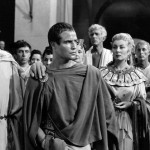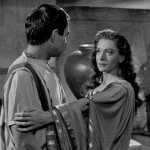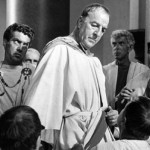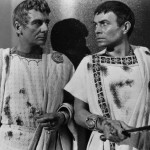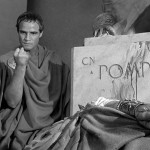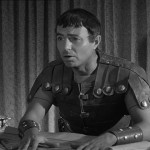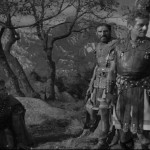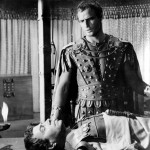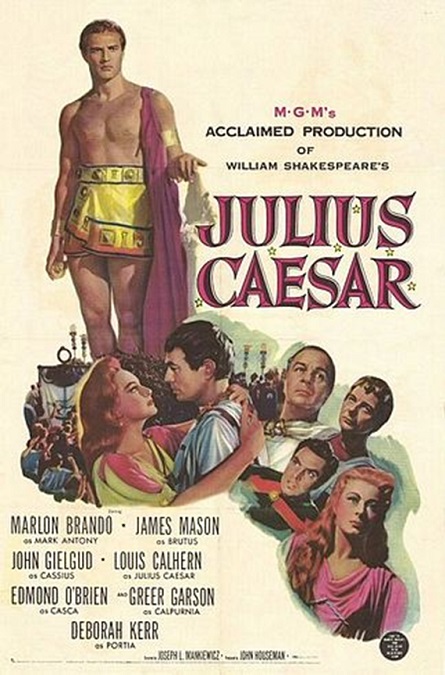
Julius Cesar – 1953
I finally understand the context of the famous line, “Friends, Romans, countrymen, lend me your ears.” It is the beginning of a speech given by Mark Antony after the death of the Emperor Julius Cesar, during which he uttered another famous line. “Et tu, Brute?” Somehow, Shakespeare never seems to get old. Over the years, there have been at least six filmed version of the famous tragedy and one TV miniseries. That’s pretty good for a play that was written 415 years ago.
The stories are good and the characters have depth. This version of Julius Cesar, starring Marlon Brando, James Mason, John Gielgud, and Louis Calhern, kept the original text and appeared to be pretty accurate with the costumes and sets. It all seemed to be done with respect to the original play, although it did seem a little odd to hear Elizabethan speech coming from the mouths of men dressed as Roman soldiers.
Brando got top billing, though he was not the main character. The real main character was Brutus, played by James Mason. Mason did a great job and handled the language well. It seemed almost natural for him, as opposed to Brando’s portrayal of Mark Antony. While Brando wasn’t struggling with the language, he did sound like he was putting on a performance, especially compared to Mason.
There were also two women in The Bard’s play, Portia, Brutus’s wife, played by Deborah Kerr, and Calpurnia, Cesar’s wife, played by Greer Garson. The two women turned in good enough performances, but their parts were so small as to be almost negligible. Portia’s part can be summed up as, “Brutus, tell me what’s troubling you.” Likewise, Calpurnia’s can be summed up as, “Cesar, I dreamed you were going to die if you left the house. Stay home today.” That was about it for the women. I don’t know the original play well enough to be sure, but I would guess that their parts were somewhat bigger.
For the most part, the acting was all top notch. Critics praised all the performances, especially Brando’s, which is something I don’t totally agree with. When he was cast, everyone was dubious, since he had just come off of portraying Stanley Kowalski so believably in A Streetcar Named Desire the year before. In that film, his accent was almost a mumble, and people were concerned that he didn’t have good enough diction to do Shakespeare justice. However, he had veteran Shakespearean actor and co-star, John Gielgud coach him, and he apparently did everything just like he was told. So I stand by my earlier statement. He gave us a competent performance, but had to work at it. It wasn’t natural for him.
Mason, however, was incredibly good and, really, the play was about his character, Brutus, and the crisis of conscious that he goes through both in deciding to murder the Emperor, his friend, and then dealing with the consequences of that decision. Then, after the citizens of Rome condemn him for his actions, which he believes were fueled by patriotism, he flees Rome and is pursued by Mark Antony. When he is defeated in battle, he commits suicide to avoid capture.
However, Brando was the big name in Hollywood and kept stealing scenes from him. Brando seemed to want the focus of the plot to be Mark Anthony, and it simply wasn’t. Mason reportedly asked director Joseph L. Mankiewicz to stop Brando from dominating the film and “put the focus back where it belongs. Namely on me!” Mankiewicz tried to do just that, but when Brando saw what he was doing, he threatened to walk off the film. However, Brando was nominated for Best Actor in a Leading Role instead of Mason, which makes no sense to me, since Mark Antony was a supporting role. But hey, what do I know?
If I had any complaint it would be in a small aspect of Shakespeare’s original play. Cesar is shown refusing the crown over and over again, but Brutus agrees to become part of the murder conspiracy just in case Cesar ever decides to take it. That doesn’t make sense to me. He might become powerful someday, so let’s kill him now… because you never know. Wow. With friends like that, who needs enemies?
